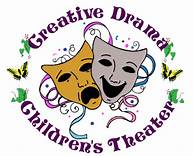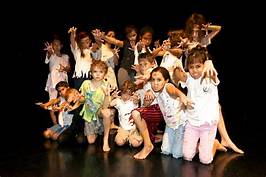HOW MANY HATS DO YOU WEAR?
by Stacy Deemar
Imagine directing sixty to seventy second graders in a musical annually. The second graders are required to perform in the musical as part of their enhanced music program. Rehearsals are not after school but rather during the forty-minute drama class that meets once a week. The script has less than twenty speaking roles and must be divided to account for an entire grade level that consists of three classes. On a marginal budget, all the actors are costumed and a simple set is created. There is no lighting designer, make-up artist, or stage crew. How many hats do you wear?
The awesome responsibilities associated with directing a musical can be overwhelming. Perseverance and flexibility are the key components in achieving a successful musical production. Forego faltering when "the best laid plans of mice and men often go awry". Someone is guaranteed to get sick on the day of the performance. Trust your wisdom and creative mind, maintain a safe space for artistic expression, and nurture the students' imagination through your passion for drama and theatre.
Divide the Script
To accommodate a whole grade level, the script is first divided into three sections because there are three classes of approximately twenty-two students. If the script has scenes, divide the scenes evenly among the classes. For example, if there are six scenes, each class performs two scenes.
Take inventory of the characters in the two scenes. Compare the number of characters in the two scenes to the number of students in the class. If there are not enough characters, divide the

character. For example, if the character roles are generic like Pirate, divide pirate into Pirate #1, Pirate, #2, etc. Apply this practice to other roles that can be divided. Conversely, if there are more parts than students, assign students to multiple roles.
Casting
With limited instructional time, there is no time for auditions. Instead, students are asked by a show of hands if they prefer a large or small speaking role. Students requests should be considered when assigning the roles.
Unisex casting is encouraged because it does not place limitations on the part a student can play.
Script and Spreadsheets
Each student is given a script with her name on the front. If the script can be reproduced, a spreadsheet is inserted t in the front of the script with each actor's name, character assignment, and page numbers where the character appears in the musical.
Students are required to bring their scripts to class each week. Furnish the classroom teacher with three classroom scripts as well as an electronic version in case a script gets lost.
Most second graders are unfamiliar with a script and have never been in a production. Students will need to be taught how to read a script. Take the time before rehearsals commence and explain the format of the script. Show how the stage directions are in italicized writing and the dialogue is in a regular font. Demonstrate how to highlight the dialogue and write directions on the script. Explain the purpose of writing down directions and encourage those to use pictures if they are unable to write.
Rehearsals
Rehearsals take place during class time. If each class meets only once a week for forty minutes, determine how many class periods will be allotted for rehearsals prior to the production.
The rehearsal process includes having the entire cast run the show in the performance space a minimum of three times. If the performance is on a stage and the rehearsal

s have been in the classroom, students will need time to get accustomed to using a stage. Students will need to learn how to use a microphone, use the exits and entrances, and get familiar with the lights shining on them.
Dress rehearsals are discouraged. If the costumes are delicate, the possibility of costumes getting torn or broken during a dress rehearsal is very high.
Email parents and the classroom teacher
Write a letter to the parents and explain the expectations of a rehearsal and each student's responsibility in the musical. Include in the email dates of when students should be off book, suggestions for how to memorize lines, information about how parents can be involved in the production, dates and times of the performances, and contact information. Attach an electronic copy of the script and spreadsheet to the email.
Send weekly updates about the rehearsal progress.
Program
Approximately one month before the performance, have a contest for students to draw the program cover. In the program, include all the content that is required by the publisher in addition to student names and special thanks. Copies of the program can be printed at school on copy paper at least one week prior to the production.
Costumes
With a limited budget, maximize every dollar. Send an email asking parents to donate costumes they currently own to refurbish or to make costumes.
Each costume is labeled with the student's name, student's teacher, and character and placed into an individual bag. All bags are placed into a box and labeled with the classroom teacher's name.
Costumes are distributed and worn no more than sixty minutes prior to the performance.
After the performance, costumes are placed back into their bags and into the appropriate box with the teacher's name.
Performance
Performing once for younger elementary students and family during the school day is ample. Having students return to school for a night performance may be burdensome for some families resulting in absent cast members.
Special Need Students
A student who is unable to read is paired with a strong reader who can assists him during the rehearsal process. The assistant can read the lines alongside the student who is unable to read or read the lines first and then the student repeats them.
English second language learners can either do their role in their native language or work with a bilingual student who can assist in translating. Students on the autism spectrum disorder can be given smaller speaking roles or pantomimed parts. A student or teacher can shadow shy and autistic students to provide individual guidance. The teacher models a scene for visual learners.
Hyper active students are given breaks to move around and a marker on the floor for placement. Hearing impaired students are placed close to the director and/or actor speaking.
Managing a Rehearsal
Explain the rehearsal process and expectations at the beginning of each rehearsal.
Give students a job to do when they are not active in a scene. Assign additional non-acting roles including a stage manager, assistant director, pencil sharpener, script manager, line monitor, theatre critic, blocking supervisor, waiting area overseer, bathroom pass controller, projection chief, gesture director, etc.
Provide an incentive for good work that can be coupled with your school's social emotional program.
Debrief
After the performance during the next drama class, congratulate the students on working diligently, cooperatively and creatively. Share your pride in their great accomplishment and review the importance of working collaboratively.
Allot time for students to share their experience performing in a musical. Pose questions that will elicit profound responses.
Most importantly, enjoy the amazing journey with your students.